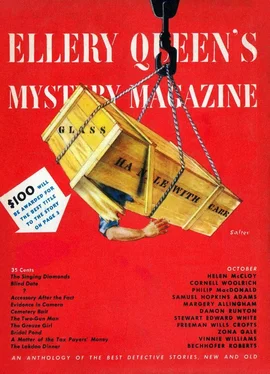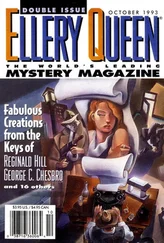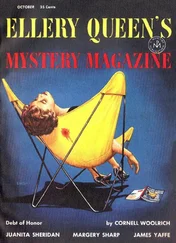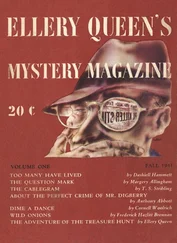Марджери Аллингем - Ellery Queen’s Mystery Magazine. Vol. 14, No. 71, October 1949
Здесь есть возможность читать онлайн «Марджери Аллингем - Ellery Queen’s Mystery Magazine. Vol. 14, No. 71, October 1949» весь текст электронной книги совершенно бесплатно (целиком полную версию без сокращений). В некоторых случаях можно слушать аудио, скачать через торрент в формате fb2 и присутствует краткое содержание. Город: New York, Год выпуска: 1949, Издательство: The American Mercury, Жанр: Классический детектив, на английском языке. Описание произведения, (предисловие) а так же отзывы посетителей доступны на портале библиотеки ЛибКат.
- Название:Ellery Queen’s Mystery Magazine. Vol. 14, No. 71, October 1949
- Автор:
- Издательство:The American Mercury
- Жанр:
- Год:1949
- Город:New York
- ISBN:нет данных
- Рейтинг книги:5 / 5. Голосов: 1
-
Избранное:Добавить в избранное
- Отзывы:
-
Ваша оценка:
- 100
- 1
- 2
- 3
- 4
- 5
Ellery Queen’s Mystery Magazine. Vol. 14, No. 71, October 1949: краткое содержание, описание и аннотация
Предлагаем к чтению аннотацию, описание, краткое содержание или предисловие (зависит от того, что написал сам автор книги «Ellery Queen’s Mystery Magazine. Vol. 14, No. 71, October 1949»). Если вы не нашли необходимую информацию о книге — напишите в комментариях, мы постараемся отыскать её.
Ellery Queen’s Mystery Magazine. Vol. 14, No. 71, October 1949 — читать онлайн бесплатно полную книгу (весь текст) целиком
Ниже представлен текст книги, разбитый по страницам. Система сохранения места последней прочитанной страницы, позволяет с удобством читать онлайн бесплатно книгу «Ellery Queen’s Mystery Magazine. Vol. 14, No. 71, October 1949», без необходимости каждый раз заново искать на чём Вы остановились. Поставьте закладку, и сможете в любой момент перейти на страницу, на которой закончили чтение.
Интервал:
Закладка:
After that I was doomed. The man became an incubus, haunting me as I drank furtively in corners or hunted our murderer with one eye, so to speak, behind me lest I myself should be waylaid. I do agree with Peterson that I am free, adult, and a member of a profession which ought at least to be able to look after itself, and I could once, I suppose, have got rid of him with brutality and the fishy eye, but I could not bring myself to do it. He was so fearful, so unmitigatedly awful, that he fascinated me. Some unsuspected masochism in my nature compelled me to be at least half civil to him, and then of course he was often so infuriatingly useful. There was a rumor that he was lucky, but that explanation did him less than justice. He was indefatigable, and his curious contacts and side jobs sometimes provided him with most useful breaks, as for instance when he nipped down to Whichborne station to oblige a man who wanted a shot of his greyhound and got instead a very fine one of the Yard’s Chief Inspector Tizer getting off the train at a time when no one was sure if the local police had appealed to H.Q. and, if so, who was going to be sent.
By the time the murderer had got round to St. Piers, Chippy was most anxious that the homicidal nut should be apprehended and the case finished. His reason was personal and typical, and I happened to know about it because he had confided it to me one night at Prinny’s Plage, when he had hounded me down to a hostelry which I felt fairly confident not even he had heard of. I can see him now, pointing to the Brewers’ Almanac which hung on the varnished match-boarding of the bar wall.
“Look, chum,” he said, his filthy forefinger tracing out the dates, “next new moon is September sixteen, isn’t it? Don’t think I’m complaining about that. It’ll still be summer then and the seaside suits me. But what about the month after? New moon October fourteen. I don’t want anything awkward to happen then, do I?”
I made a point of never giving him encouragement and I said nothing, knowing perfectly well I should not silence him.
“October fourteen.” He was indignant. “The Distillers Livery Company conference begins on the fourteenth. Fancy missing that. What a tragedy, eh? What a tragedy!”
That was in August. We were all expecting the September murder, although naturally there was no way of telling where it was going to crop up. When the news broke just too late for the edition which everybody was holding for it in a shamefaced way, it was very nearly anticlimax. As Peterson said, there would have been almost more news value in the story if it hadn’t occurred. No one was pleased. The livelier dailies had planted men at most of the larger southern watering places but no one had thought of St. Piers, cheap and respectable, out on the mud-flats of the estuary. We had a local correspondent there, as we had in every town in the country. The last thing he had sent us, according to the book, was an account of a stork which a coachload of machine-shop operatives had seen flying inland one evening in June the previous year. According to his story, the phenomenon had caused wild excitement in the town. It appeared to be that sort of place.
I managed to avoid Chippy going down but I saw his back disappearing into the Railway Tavern as I picked up a taxi at the station. I was glad of the respite, for the newsflash which had come in was so familiar in its wording — Body of well nurtured woman found strangled. Lonely woodland. Auburn-haired. Chief Inspector Tizer hurrying to scene — that I felt a wave of pure nausea at the prospect of having to deal with him as well.
St. Piers was much as I had feared. At first it is only the light and the faint smell of iodine which warns the newcomer that the coast is at hand; but towards the front, where the architecture veers on Victorian Moorish, a faded ocean licks a dun-colored strand and the shops sell colored buckets and sticks of sweet rock and crested china to take home.
I found our local correspondent, a tobacconist called Cuffley, in his shop on the parade. He was waiting for me on the step, every hair in his mustache electrified with excitement. He had leaped to the job, had been on the spot soon after the body had been discovered, and had had a word with the inevitable small boy who had given the first alarm. He had even written a short piece which began, as I remember, Mad Killer Visits St. Piers At Last. A baleful sun rose early this morning over the muncipally maintained woodland behind the Kursaal and must have shone down unheeding for quite a space on the ghastly blue contorted lips of a respected local resident ...
However, he had got the victim’s name and address for me and had written it down in block caps on the back of one of his trade cards: MRS. LILY CLARKE, KNOLE, SEAVIEW AVENUE. It was the same sort of name and the same sort of address as all the others in the long weary business, and when he told me with delight that he had recognized a relation of the dead woman among his customers, and had gone to the length of having her waiting for me in the little room behind the shop, I knew before I saw her exactly the kind of gal I was going to find. The sameness of all five cases was slightly unnerving. I recognized at once both her horror and the dreadful secret enjoyment she was finding in it. I had seen it often that summer.
Her story, too, was a fifth variation of a tale I had heard four times already. Like her predecessors, Mrs. Clarke had been a widow. She had not dyed her hair exactly but she had touched it up. She had not taken in lodgers in the ordinary way, being much too refined. But yes, on occasions she had obliged. The idea of her going for a walk at night with a man she did not know! Well, if the situation had not been so tragic the relation would have had to laugh, she would r ee lly.
I asked the question I had grown used to asking. “Was she a nice woman? Did you like her?” I was prepared for the girl’s hesitation and the faint uneasiness, the anxiety to speak well of the dead. I remembered comments on the other women. “She had a temper.” “You would not call her exactly generous.” “She liked her own way.” “She could be very nice when she wanted to.”
This time Mr. Cuffley’s customer, in speaking of Mrs. Clarke, said something which seemed to me to sum them all up.
“Oh, she was all for herself,” she said grimly and shut her mouth like a vice.
At Sub-Divisional Police Headquarters there was no information of a startling character. Mrs. Clarke had met her death at some time before midnight and in the process she had not been robbed. Fifteen pounds in treasury notes had been found in the mock-crocodile handbag which still hung from her arm. The sergeant in charge spoke of the negligence of the criminal in this respect with an amazement which bordered upon indignation. The only blessed things she had lost, he said regretfully, was a silver tassel which had hung from the old-fashioned silver brooch she wore in her lapel — and, of course, her life.
As in all the earlier crimes there was absolutely no suspect. There were no visitors staying at Knole, Seaview Avenue, and so far no one had come forward to report having seen the woman out with a stranger.
I sent my story off and took a tram to the Kursaal. Half the town appeared to have the same idea and I joined a stream of consciously casual strollers advancing purposefully up a threadbare path between ragged illused trees. The body had been found in a dusty glade where cartons and little scraps of paper grew instead of anemones. The spot needed no signpost. The police had got their screens up and I could see Inspector Tizer’s hunched shoulders appearing above one of them.
The sightseers stood around at a police-prescribed distance and here again nothing was new. In the last few months reams had been written about the avid, open-mouthed defectives who had come to stare at the last couch of each of the victims, and here, as far as I could see, they all were once more. I felt certain I had seen the dreary man with the fascinated blue eyes and the watch-chain full of darts medals at every road accident, case of illness in the street, or mere surface reconstruction at which I had had the misfortune to be present. The adolescent girl with the weeping baby brother was familiar, too, and as for the plump middle-aged man with the broad smile he could not possibly have known he was wearing, I was sure I had seen him, or someone very like him, grinning at the scene of every catastrophe in my experience. They were all standing about, looking and hoping, God knew what for. One group, which contained at least one collapsible perambulator, appeared to be thinking of picnicking.
Читать дальшеИнтервал:
Закладка:
Похожие книги на «Ellery Queen’s Mystery Magazine. Vol. 14, No. 71, October 1949»
Представляем Вашему вниманию похожие книги на «Ellery Queen’s Mystery Magazine. Vol. 14, No. 71, October 1949» списком для выбора. Мы отобрали схожую по названию и смыслу литературу в надежде предоставить читателям больше вариантов отыскать новые, интересные, ещё непрочитанные произведения.
Обсуждение, отзывы о книге «Ellery Queen’s Mystery Magazine. Vol. 14, No. 71, October 1949» и просто собственные мнения читателей. Оставьте ваши комментарии, напишите, что Вы думаете о произведении, его смысле или главных героях. Укажите что конкретно понравилось, а что нет, и почему Вы так считаете.












